Born five years apart, sisters Joyce and Jandyra Magdalena dos Santos Cruz lived together in a simple low-rise in Guaratiba, a poor neighbourhood of Rio de Janeiro, with Joyce’s four children, Jandyra’s two daughters, and their mother, Marie Ângela. Like many Brazilian families, their lives were inextricably meshed by economies of scale.
It was the honey-coloured eyes they also shared that Joyce Magdalena recognised last August, when Jandyra was found inside a burnt-out car. She had been mutilated, dismembered and charred beyond identification. She had climbed into the same car a day earlier, at a bus station in the nearby town of Campo Grande, to be taken for an illegal abortion.
“The press said they cut off her hands,” says Joyce. “It wasn’t just her hands. They took off her arms, legs, teeth. A woman so beautiful. OK, she committed a crime, but she was committing a crime against herself, against her own life. It didn’t hurt anyone.”
Were it not for the brutality of the case, Jandyra might have become just another statistic: another woman having one of the estimated one million abortions carried out every year in Brazil, where it is punishable by up to three years in prison. Even her death would have been unlikely to raise more than a passing mention. It is claimed that every two days a Brazilian woman dies while trying to end a pregnancy, and there are 200,000 hospital admissions a year as a result of bungled procedures. But Jandyra’s fate shone a light on the cruel, illegal trade in women’s desperation. It stirred women’s rights groups and activists, giving a high-profile face to their controversial cause: “How many more Jandyras?” and “We are all Jandyra” were the straplines on the protest posters in Copacabana last September.
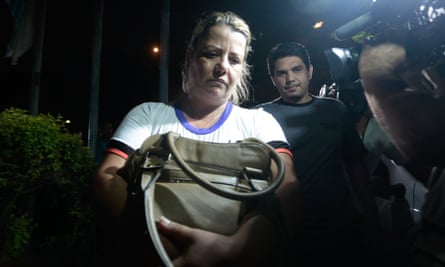
According to the police investigation, she was the victim of a criminal gang running an “abortion business”. Along with two other women, Jandyra, aged 27, was met by the gang’s driver at the bus station so as to hide the makeshift clinic’s address, and driven to a rented home in a private condominium. The alleged gang ringleader, Rosemere Aparecida Ferreira, reportedly admitted to police that Jandyra had paid R$4,500 (£1,100) for the termination carried out by an unlicensed doctor, Carlos Augusto Graça de Oliveira, but said she had not been there at the time. Ferreira claimed she was later called by the driver to say only that there had been “a problem”.
It is suspected that Jandyra suffered fatal complications during the abortion, with prosecutors alleging the gang then disfigured her body to protect themselves by preventing her from being identified. Her limbs, fingers and dental arch were removed, and her body set alight. “I couldn’t do this to a dog, a cat, a parrot,” says Joyce. “They don’t have consciences – they are monsters. These clinics are not thinking about the wellbeing of the woman. They’re thinking about money.
While Jandyra’s death shocked Brazil, the death of a housewife in another botched abortion in Rio just a month later thrust the law into the spotlight immediately before October’s general election. Elizângela Barbosa, 32, died after a plastic tube was left in her uterus. She had been in a similar situation: she had three children and could not afford a fourth. “I don’t think she would have had so much courage, but she was really tormented about this,” says her sister Sandra Barbosa, still in shock. Sandra is now bringing up Elizângela’s seven-year-old daughter and one-year-old son, while her four-year-old boy stays with his father. Police arrested a woman called Ligia Maria Silva, who reportedly started performing clandestine abortions 20 years ago after carrying out her own.
“It’s totally illegal, so the women have abortions in the worst conditions,” says Dr Marcelo Burlá, president of the Gynaecology and Obstetrics Society of Rio de Janeiro state. “We have a lot of bad problems, like hysterectomies, like bleeding, like women not able to be pregnant again. All because we have a legal condition that doesn’t support the women who don’t want to have a baby.”
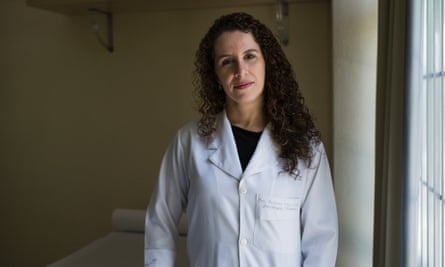
There are only a handful of exemptions to the ban on abortion – to save the mother’s life, if the pregnancy was a result of rape, or, in a recent controversial addition, if the foetus has anencephaly, a rare birth defect in which the brain and skull do not develop. By October, police in Rio had made 61 arrests as part of the 15-month-long Operation Herod, which investigated an illegal abortion set-up charging up to £1,800 per procedure. The gang allegedly carried out up to 20 abortions a day. In 2013 there were only 1,520 “legal” terminations carried out by the public health service.
In an otherwise sparse living room in Guaratiba, under an unforgiving bare light, there’s a little plastic Christmas tree sitting beside the TV. It is mid-November, three months after Jandyra’s death, and the festive season has been brought forward to give her motherless daughters, who are just eight and 11, some hope of happiness.
“We tried to convince Jandyra not to do it,” Joyce says. “But she thought she had no other option. In that moment of despair, she took this difficult decision.” Like many, Jandyra opposed abortion, but was faced with raising another child unwanted and unsupported by its father. “I think there should be a law that says after two children, we’ll tie the tubes. Two children is sufficient,” Joyce adds.
After her last pregnancy, Jandyra had wanted to have tubal ligation but, at 18, was told she was too young. Elective sterilisation is available on Brazil’s public health system for women over 25 or with at least two children, and with their husband’s consent. Joyce says there is a need for greater use of contraception in such a sexualised culture. “Women feel alone because the men in Brazil disappear,” Joyce tells me. “It’s a culture where women and men have various relationships; it’s a normal thing to have sex. But then men abandon women.” In a country where the minimum wage is £180 a month and where more than 11 million people live in favelas, each child can be too great a financial burden.
“It used to be that you finished school and you got a job,” Joyce says. “Now you don’t get anything. Imagine me, with four children – it’s going to be much harder than for someone who has two or one. I know it involves questions of religion. I’m evangelical; it’s very controversial. But my religion doesn’t have any problem with vasectomies, with tying tubes. I think we need a more rigorous law to protect women from desperate situations.”
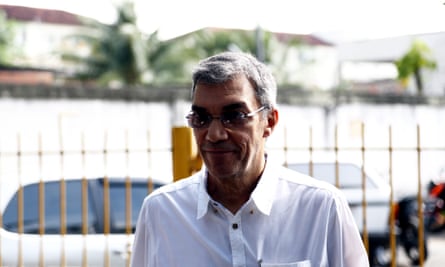
Though definitive statistics are almost impossible to obtain, according to a pioneering field study, the 2010 National Abortion Survey, one in five Brazilian women have had at least one abortion by the age of 40 (in Britain the figure is one in three). Conservative estimates suggest 800,000 clandestine abortions are carried out a year, while pro-choice campaigners cite one million. “Women are afraid of telling us the truth,” says Debora Diniz, one of the authors of the study. “We have concrete reasons to believe that the number is even higher because women have reasons not to tell the truth, even using a secret ballot box.”
In Rio the scale of the organisation running clandestine clinics became clear during the police operation. Among those arrested were six doctors, two lawyers and several police officers. They were said to have co- ordinated illegal abortion centres in several neighbourhoods. The alleged gang leader, 88-year-old Aloísio Soares Guimarães, was reportedly found with statements for $5m in a Swiss bank account. Glaudiston Lessa, a police officer, told O Globo that the gang had carried out an abortion on a girl as young as 13.
When I meet Luciana Lopes, Rio’s co-ordinator for Brazil Without Abortion, the first thing I see is the stirrups of her new examination table. Also a gynaecologist, Luciana is setting up her surgery in the north of the city. She firmly rejects the estimated abortion rates. “If it’s clandestine, there’s no official information,” she says. “But even among the woman who do have abortions, many are not in favour. It’s not just about whether it’s legal or not – it’s a question of the woman living with committing murder. It’s a life that she is taking.”
I ask if she knows any women who have had abortions. “Many,” she says, nodding, but she adds that women are not criminalised for it. “We know that abortion carries risks to the life of the woman – illegal abortion as much as legal abortion,” she says, adding that the movement would like to see the legal exemptions removed and abortion completely criminalised. “Even if she is pregnant and doesn’t want the baby at all, doesn’t recognise the baby, the other line that we take is adoption. She doesn’t need to kill, doesn’t need to put her life at risk.”
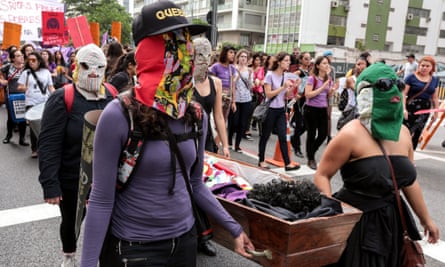
Recent research suggests that 65% of Brazilians support the current restrictions on terminations. In the world’s biggest Catholic country, it is small wonder. But Brazil’s relationship with religion and abortion is more nuanced. In the 2010 abortion survey, faith appeared to play little part: most women who had abortions said they were also Catholic. Yet religious conservatism meant that despite two high-profile cases, abortion was hardly discussed during last year’s presidential election.
“Brazil is a country formed under the sign of the cross. Everything good and not so good that happened had the strong presence of the Catholic church,” says Eduardo Jorge, the Green Party presidential candidate who supports the legalisation of abortion. He says there is no explicit condemnation of abortion in the Bible. “We need more liberal and enlightened political leaders to talk to the people about their reasons. Only with dialogue and debate will it be possible to change the current law, which is retrograde and sexist, causing death and suffering to women and their families.” When I ask how long it might take to change the current legal situation, Jorge replies: “God only knows.”
Though there appears to be little link to religion, abortion is more common among women with low levels of education. Diniz says it’s not clear why, but one likely explanation is that they are using contraception methods incorrectly. “Abortion and the risks of illegality are basically a problem for the poor and black women of Brazil,” Diniz says.
Micheline Alves, 40, a journalist for a women’s magazine and a mother of two, has a very different abortion story. She lives in a chic boho neighbourhood in São Paulo, a world away from Guaratiba, Rio. At six weeks pregnant, she found a trusted doctor known among her circle of friends who would carry out abortions from his clinic in a hospital. Because of the early stage of her pregnancy, she paid £870. “The crazy thing for me in Brazil is that a middle-class person in a big metropolis like this can easily find a doctor who will do a safe abortion,” Micheline says.
For her, the decision was straightforward, made easier by access to a reputable medical professional. “The fact that I was already a mother made it all the more clear,” she says. “I have an idea of how much a child changes your life, and I was sure – without talking with my partner, before I told anyone – that it wasn’t time.”
On the day that Micheline went for her consultation, the names of 20 other women were tacked to the doctor’s wall, each one paying close to or just over £1,000 for the procedure. “This consultation was difficult, despite my conviction,” she says. “Firstly because it was clandestine. Also, however secure you are with your decision, the moment you meet with a doctor can feel strange. But in the end the process was very simple.”
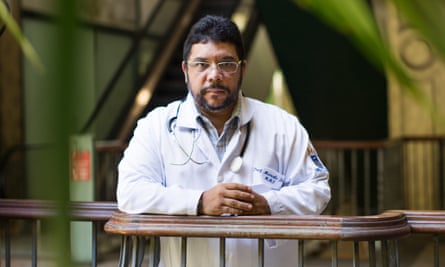
Her misgivings centre on the inequalities of a clandestine business. She says her realisation that she was one of the “hidden” women prompted her to write about her experience.
“The doctor created a system that resolved a problem that Brazil is refusing to resolve,” she says. “It’s crazy because on the other hand, he also does it because it pays. But he’s a good doctor, does it correctly. He’s running a high risk. Abortions are being carried out in Brazil – it’s just that they are being carried out in very unequal conditions. In all these cases, the questions stay in the shadows, in the dark. You can’t have clear measures. You can’t leave all these people underground.”
Whatever the real number of women aborting pregnancies, the law that makes it a crime is not protecting them. With such a tangle of religious and moral opposition, change seems a long way off.
Meanwhile, in the absence of justice or answers, Jandyra’s family turn to their only comfort. “We have faith in God,” Joyce says. “Jandyra could be another statistic, but she’s not. She’s an icon of respecting other opinions, because we are against it, others are in favour, and we have to have a debate.”
When Joyce considers what she might ask those responsible, she says: “I want to know what really happened, whether she woke up or if she was totally anaesthetised when she died. They can do what they want with her body – flesh is flesh. But I want to know if she felt pain. It’s an answer we deserve.”
- This article was amended on 5 March 2015 to remove references to “pro-life” stances. Our style is “anti-abortion”.
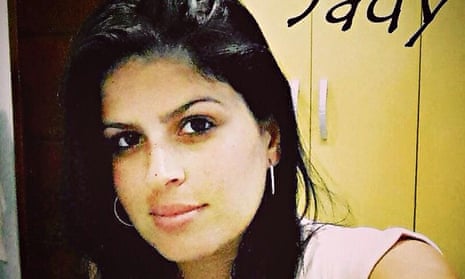
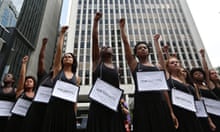

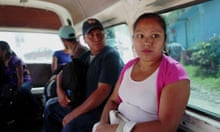

Comments (…)
Sign in or create your Guardian account to join the discussion